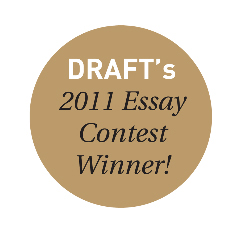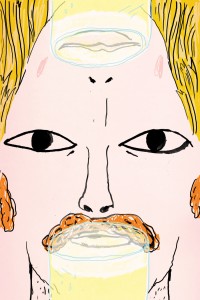How Andrew Ladd found his roots in Lithuanian wheat beer.
I was 20 when I visited Lithuania almost a decade ago, for the first and only time. There are lots of good reasons to remember the trip: the picturesque countryside, the fascinating historic sites, and where I stayed in an old, crumbling apartment building across from the Finnish embassy, whose 24-hour guard stared suspiciously whenever I came and went. Instead, though, what I remember best is a single pint of hefeweizen.
Not because it was a particularly good hefeweizen—it was a mass-produced brand that I’d now describe as the Bud Light of the Baltics—and not because I was stunned by its relatively crisp, honey-lemon flavor. No, it was because of my drinking companions that night: a preternaturally blonde 11-year-old named Aiste and her college-aged sister, Ieva, who I’d met that same afternoon—and who were, I’d found out a few hours earlier, third cousins of mine.
I already knew I had Lithuanian relatives, of course—I had come to Lithuania with my mother to inter her parents’ ashes in the old family grave—but mostly, they were a mystery to me. So was Lithuanian culture in general, and I was just fine with that. In my experience, “Lithuanian” mostly meant impossible-to-spell names, mind-numbingly dull videos of folk dancing and strange preparations of cabbage at Christmastime.
So I’d been ambivalent about the trip to Vilnius. I knew it was important to my mother that I go with her, that she wanted me to connect with my “roots.” But I could think of better things to do the summer before my junior year of college, and besides, I couldn’t help but wonder: Were these really my roots?
After all, I didn’t speak the language, had taken my father’s American surname and had grown up thousands of miles away. Even my grandparents hadn’t been back to Lithuania in decades, and despite the occasional plate of yuletide cabbage when we visited, I remembered them as more American than anything else. How much connection could I possibly have to this surreal, post-Soviet backwater?
The phalanx of distant relatives who appeared my second day there, Ieva and Aiste among them, did nothing to quell those doubts. Rather, it felt much the same as any other Lithuanian social afternoon I’d endured while visiting my grandparents, the crowd of strangers taking turns asking, via my mother’s interpretation, what I was interested in at school (“Science? Was it science?”) and then raving about the family resemblance. (I didn’t see it.)
After hours of that, though, it was announced that Ieva and Aiste, as resident young people and English speakers, would be taking me out for some Lithuanian hospitality. And that was how we ended up at a bar on the outskirts of downtown Vilnius, poised for that unforgettable drink.
Inside, the bar was an underground maze of dim lounges and sweaty dance floors, but it was a crisp August evening so we sat outside instead, in the bombed-out foundations of an old building, filament lightbulbs festooned where the ceiling used to be and a Russian folk duo singing beautiful, incomprehensible guitar ballads. The place was packed, the breeze gentle, and as Ieva disappeared to fetch our Baltic swill, the sun sank into a bright orange dusk. It all felt quite perfect, and the hefeweizen, when it appeared, was no different.
Actually, I wouldn’t work out it was hefeweizen until much later. Kvietinis alus was the Lithuanian name for it, but though Ieva knew alus meant beer, the kvietinis part had her stumped. As we drank we tried to muddle out some common point of reference to decipher it, but quickly we tired of the mystery drink and moved on to each other.
She was studying anthropology, it turned out, which I was minoring in; she liked many of the same bands I did. In the fall she would be moving to Montreal, where I was already at college. The more similarities we found, the more amazing it seemed: Whatever small piece of DNA we shared seemed to have prevailed, across thousands of miles and even across this cultural rift that still felt, to me, entirely impassable.
Gradually, though, beer in hand, it dawned on me that “roots” didn’t need to mean a connection to Lithuania, or Lithuanians, or even to pickled cabbage. Instead I only needed to feel a connection with my family, with this handful of people and their surname, etched in stone on the grave we’d visit the next day.
So when Aiste, bored of listening to Ieva and me talk about anthropology, challenged me to a best-of-three, no-laughs staring match, and promptly lost; when she pouted across the table in defeat, and narrowed her eyes; when she tilted her head thoughtfully and said to me, as I took the last swig of my beer, “It’s weird that you’re my cousin,” suddenly, I knew exactly what she meant. •
Andrew Ladd of Somerville, Mass., is the winner of DRAFT’s 2011 essay contest, “How One Beer Changed My Life.” For future essay contests and chances to win beer gear, festival tickets and more, visit draftmag.org/contests.

